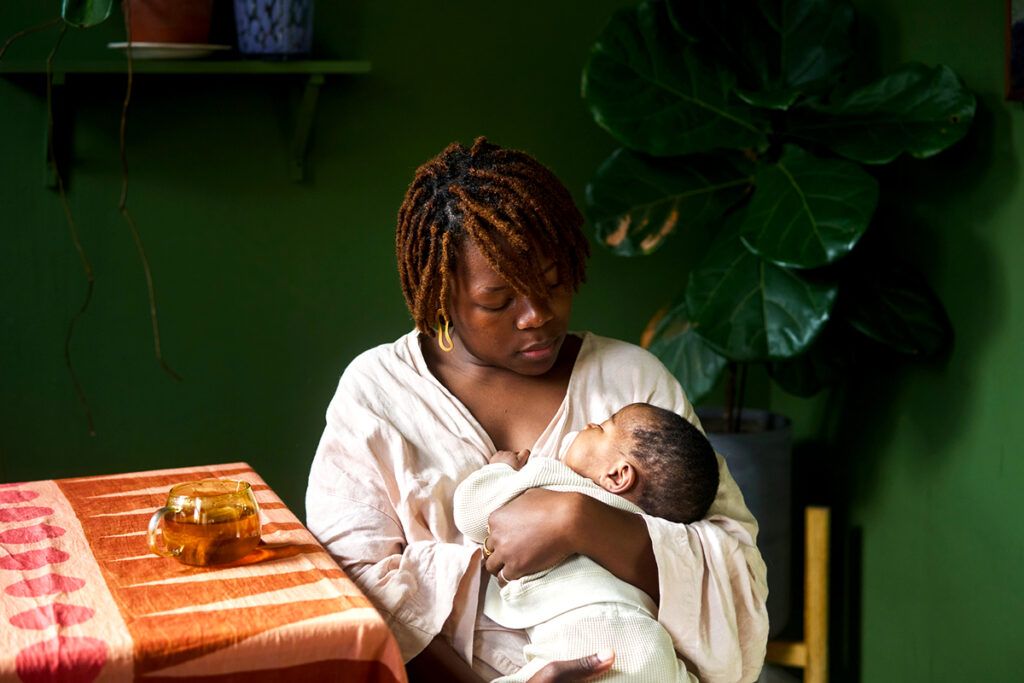Eczema is a group of chronic inflammatory skin conditions that can affect people of all ages. Babies and infants may develop eczema, although the first signs may appear at around ages 2 to 6 months.
Causes and triggers of eczema in babies

Common causes and triggers of eczema symptoms in babies may include:
- Genetic factors: Babies with a family history of eczema, asthma, or allergies may be more likely to develop eczema.
- Immune system challenges: The immune system is still developing in babies, making them more likely to experience allergies and inflammatory reactions that can manifest as eczema rashes.
- Dry skin: When the skin barrier is compromised, it becomes more sensitive to irritants and allergens. This can cause inflammation and eczema flare-ups. Dry skin is a common eczema trigger.
- Allergens: Exposure to allergens, such as dust mites, pet dander, pollen, mold, or certain foods, may trigger eczema symptoms in some babies.
- Irritants: Harsh soaps and detergents may lead to eczema symptoms or trigger flare-ups.
- Climate and weather conditions: Cold weather can cause dryness and worsen symptoms, while heat and humidity may lead to itchiness and irritation.
Types of eczema in babies
Common types of eczema in babies may include:
- Atopic dermatitis: This is the most common form of eczema in babies and is linked with a family history of allergies or asthma.
- Contact dermatitis: This happens when the baby’s skin comes into direct contact with an irritant or allergen, leading to an allergic reaction.
- Seborrheic dermatitis: In babies, this is known as cradle cap. It mainly affects their scalp and face.
- Dyshidrotic eczema: This manifests as small, itchy blisters on a child’s hands and feet.
Symptoms of eczema in babies
Symptoms of eczema in babies may vary depending on their age, environmental factors, and symptom management.
Up to age 6 months
- swollen, dry, and itchy patches of skin, usually on the face (especially cheeks and chin), scalp, or trunk
- changes in skin color and texture
- small, raised bumps that may leak clear fluid and crust over when scratched
- intense itching
- skin infections
- thickened, scaly, or rough skin in affected areas
Ages 6 months to 2 years
- similar symptoms to younger babies
- the rash may spread to other areas, like the elbows and knees
- drier skin that may crack or bleed
- sleep disturbances due to itching
- skin infections
- irritability and fussiness
Ages 2 to 5 years
- eczema rashes become more common around the folds of the arms and legs, wrists, ankles, and neck
- changes in skin color and texture
- itchy, swollen patches of skin may develop, often with a dry and rough texture
- continued scratching can lead to the formation of scabs or small wounds
- skin infections
- irritability and fussiness
Ages 5+ years
- common around the hands, wrists, inner elbows, back of the knees, feet, and ankles
- itchy and inflamed skin patches with scaling or flaking
- thick skin due to scratching
- increased chance of secondary bacterial or viral infections due to broken skin
Differentiating eczema from other skin conditions like acne, psoriasis, and scabies may be challenging as some symptoms may overlap. But here are some factors to consider:
- Location and distribution: Eczema in babies tends to appear on the face, scalp, and body folds. Other conditions like acne often occur on the face, while psoriasis may have distinct lesions on the elbows, knees, and scalp.
- Itching: Eczema may cause persistent, intense itching, which is less common in other conditions like acne or psoriasis.
- Family history: A family history of eczema, allergies, or asthma increases the likelihood of eczema in babies.
- Persistence and recurrence: Eczema often persists and tends to have recurring flare-ups over time. Other conditions, like scabies, may have a more sudden and intense onset.
How to manage eczema in babies
Managing eczema in babies may involve:
- moisturizing the skin to help to keep it hydrated and prevent dryness
- identifying and avoiding allergens and irritants, such as harsh soaps, which can aggravate eczema
- avoiding tight-fitting clothes or garments with rough seams that further irritate the skin
- in severe cases, a pediatrician may prescribe corticosteroid creams or ointments to help alleviate itching and reduce inflammation
Not all medications for eczema are suitable for babies and children. Your baby’s doctor may recommend:
- corticosteroids like hydrocortisone
- topical calcineurin inhibitors (TCIs) like pimecrolimus cream (Elidel) and tacrolimus ointment (Protopic) for children ages 2 years and older
- monoclonal antibodies like dupilumab for children ages 6 months and older
Caution is highly advised when considering over-the-counter and prescription eczema medications for babies and children. It is always a good idea to consult your child’s pediatrician before trying drugs or home remedies.
If you need help covering the cost of medications, the free Optum Perks Discount Card could help you save up to 80% on prescription drugs. Follow the links on drug names for savings on that medication, or search for a specific drug here.
